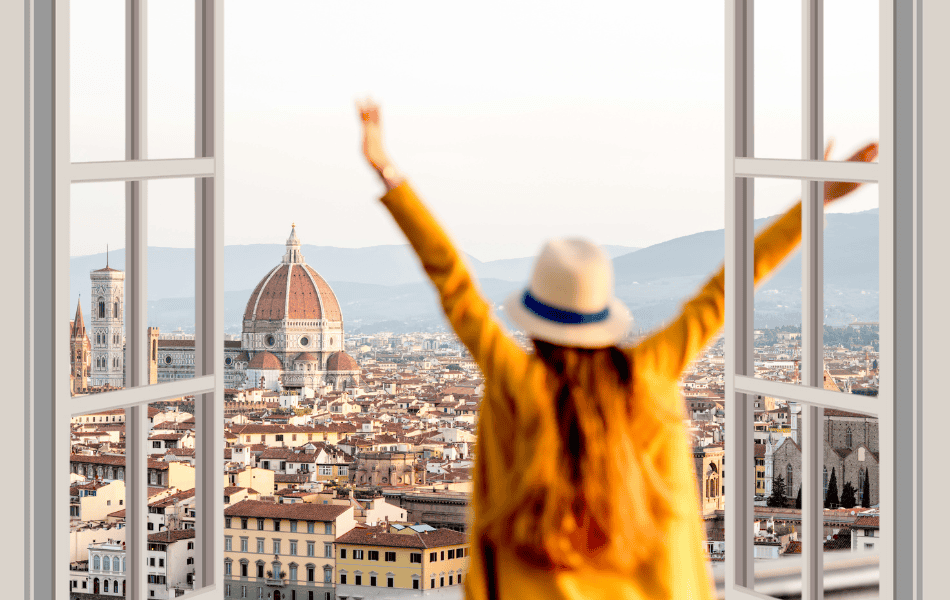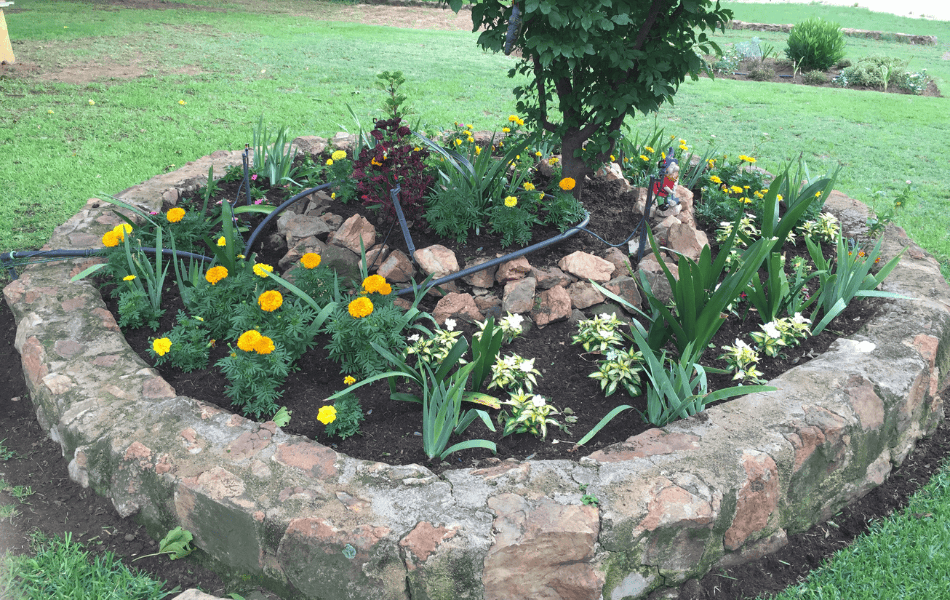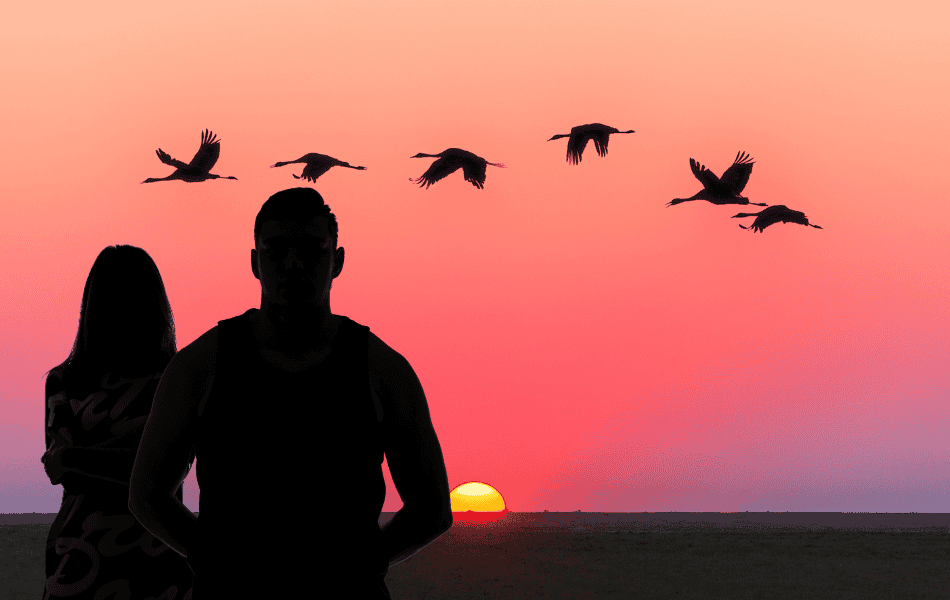From fear to freedom—discover how travel opened my eyes, healed old wounds, and redefined what “home” truly means. A journey of courage, loss, and renewal.
I didn’t know I was living in a constant state of tension until I stepped into a quiet village in Italy and realised what it felt like to truly exhale.
For years, “home” was a place filled with love, family, animals, and the kind of memories you think will last a lifetime. We built a life of joy and purpose on our small holding in South Africa—a peaceful haven where our children thrived, horses grazed in the fields, and weekends were spent at horse shows or sleeping in the stables, waiting for new foals to be born. It was everything we dreamed of.
But as time went on, the meaning of home started to shift. It became a place of growing unease, then fear, then danger. The life we once nurtured so carefully began to feel like something we had to survive rather than enjoy. And I never would have fully grasped how much we had lost—how much we were enduring—until I travelled. It was only through stepping outside of what had become “normal” that I saw just how far removed we were from true safety, freedom, and peace of mind.
This is the story of how travel helped me redefine what home really means.
“I didn’t know I was holding my breath until I finally exhaled in a little town on the Adriatic coast.”
The Home We Built: Life in South Africa Before the Shift

Before everything changed, our life on the small holding just outside Johannesburg was something out of a dream. Nestled among rolling fields and big skies, our home was a sanctuary—a place where the air was filled with the sounds of birdsong, the gentle snorts of horses, and the laughter of children running free through the paddocks.
Our children had an idyllic upbringing. They grew up surrounded by animals—horses, dogs, cats, and a cacophony of birds that made every morning feel alive. Weekends were spent travelling to horse shows as a family, with trailers hitched and excitement in the air. During foaling season, we camped out in the stables, watching over our mare as she brought new life into the world. It was magical. There’s a quiet intimacy that comes from those long nights in the straw, whispering encouragement to an anxious mare and witnessing the miracle of birth. Those moments are etched in my heart.

Our home wasn’t just a place to live—it was the foundation of everything we had built. I started and ran my manufacturing business on our property, something I had poured my heart and soul into. Watching it grow, step by step, from a simple idea into a thriving operation was deeply fulfilling. I took immense pride in knowing that every part of our life—from the business to the family meals to the horses galloping freely—was rooted in hard work, love, and purpose.

We were part of a close-knit rural community, where neighbours knew each other by name, and help was always just a knock away. The rhythm of our days was steady and peaceful, guided by the seasons, the school calendar, and the needs of our animals. It was a deeply rewarding way of life—one that felt grounded, wholesome, and safe.

At the time, I truly believed this was the life we would grow old in. A forever home. A legacy. But even the most perfect worlds can begin to crack without warning.
| Suggested Book: Home Sweet Anywhere: How We Sold Our House, Created a New Life, and Saw the World by Lynne Martin |
The Decline: When Safety Became a Memory

The shift didn’t happen overnight. It was a slow, creeping change—subtle enough at first that we tried to ignore it. But piece by piece, the life we had so carefully built began to unravel. What once felt like a sanctuary started to feel like a place under siege.
Crime in South Africa was nothing new, but it became impossible to keep at arm’s length. We began hearing more stories from neighbours—carjackings, home invasions, daylight robberies. The news was filled with violence, but then it started arriving at our doorstep. One of the most devastating moments was when two of our beloved horse grooms were shot and killed on our own property. It was a senseless, brutal act, and it shook us to our core. These were people who had become part of our family. Their loss was more than a tragedy—it was a sign that our world was no longer safe.
After that, everything changed.
We fortified our home—electric fencing, motion sensors, panic buttons. We became experts in vigilance. At 6 pm every evening, we would close the curtains and avoid walking past windows for fear of being shot at. Driving became a tense experience. Stopping at a traffic light meant scanning your surroundings constantly, just in case a “smash-and-grab” happened in those few seconds. My daughter couldn’t safely drive home alone after dark. We couldn’t leave our doors unlocked even in broad daylight. Our lives became a routine of precautions.
And then, we were attacked and robbed inside our own home. The very place that had once felt sacred, protected by love and memory, became a scene of trauma. The violation went beyond physical—it was emotional, psychological, and spiritual. The fear seeped into everything. You stop sleeping soundly. You flinch at unexpected noises. You stop living and start enduring.
The emotional toll was immense, not only on us but on our children too. As they grew older, they began to see the writing on the wall. One by one, they made the heartbreaking decision to leave South Africa—seeking safety, stability, and a future elsewhere. The house, once full of noise and life, became quiet. The joy of watching our grandchildren play in the garden was replaced with long-distance video calls and empty spaces where laughter used to echo.
The day I realised this life was no longer sustainable wasn’t marked by a single event—it was the culmination of a thousand small moments. The constant fear. The anxiety etched on my daughter’s face as she checked in after a drive. The silence around our dining table. The fatigue of always having to look over our shoulders.
We were still living in the same house, but it wasn’t home anymore. Not in the way it used to be. Safety had become a memory, and we were exhausted from pretending it could ever return.
The Turning Point: Travel as a Window Into Another Life

The first time I travelled overseas with my son and daughter-in-law, I wasn’t prepared for the emotions that would rise to the surface. We landed in Italy, and from the moment I stepped onto the cobbled streets of Florence, I felt something unfamiliar stirring inside me. At first, I couldn’t put my finger on it. It was subtle—a sense of lightness, an absence of the ever-present tension I had carried for years.
We wandered through piazzas alive with music and laughter, locals sipping espresso at sidewalk cafés, children running freely without anyone casting nervous glances over their shoulders. In the evenings, we strolled through quiet neighbourhoods under soft, golden light without needing to rush indoors before nightfall. I remember stopping at a traffic light and thinking, I’m not scanning the street for danger. That realisation hit hard. Safety—a feeling so basic, so human—was something I hadn’t truly felt in years.
Then we visited Montenegro, and I was completely enchanted. The natural beauty was breathtaking—towering mountains that kissed the sky, the shimmering Adriatic stretching endlessly, and old towns that felt like pages from a fairytale. But what struck me most wasn’t the scenery. It was the stillness. The peace. The way strangers greeted you with genuine warmth. The way people left their front doors open while they watered their gardens or sat chatting on porches. The trust. The calm.
No high walls. No electric fences. No panic buttons. And yet, I felt safer than I had in my own fortified home.
It was in those quiet moments abroad—walking alone at dusk without fear, sitting at a café with my back to the street without flinching, chatting to a stranger without suspicion—that the contrast became painfully clear. I had become so used to living in fear, I hadn’t realised how much of life I had stopped living.
Travel didn’t just open my eyes to the beauty of other countries. It reminded me of what it felt like to be free. Not just physically—but emotionally, mentally, spiritually. It was the first time in a long while that I felt like myself again, unburdened by fear. And it was in that space—between old wounds and new wonder—that I began to ask myself the hardest question of all: What if we didn’t have to live like that anymore? What if we could start over?
| Suggested Book: Why Travel Matters: A Guide to the Life-Changing Effects of Travel by Craig Storti |
The Move: Choosing Healing Over Fear
The decision to leave South Africa wasn’t made overnight. It came after countless conversations, sleepless nights, and deep soul-searching. For so long, we had clung to the belief that things would get better, that the country we loved so dearly would find its way back. But after each attack, each close call, and each tear-filled goodbye as our children moved abroad, it became clear: staying was no longer brave—it was costing us too much.
When my son and daughter-in-law moved to Montenegro and shared their new life with us—the safety, the serenity, the sense of possibility—I felt a spark of hope. Not just for escape, but for healing. Slowly, we began to envision a life beyond the walls we had built, both around our home and around our hearts. My brother joined in the decision, and together we made the leap.
The process was overwhelming. Saying goodbye to the land we had poured our lives into felt like letting go of a part of our identity. We sold the business I had built from the ground up, parted ways with the animals we had to rehome, and walked through the house one last time—each room heavy with memories. It was heartbreaking. Uprooting your life is never easy, especially when your roots run so deep.
And yet, the moment we arrived in Montenegro, a different kind of emotion began to surface—relief. The air felt clearer, the pace slower. The people welcomed us with warmth and respect. We were strangers, but never outsiders. Life here moved to a gentler rhythm, one we hadn’t experienced in years.
The landscape itself seemed to soothe old wounds. Majestic mountains, glassy lakes, olive groves, and sea views that steal your breath—it all felt like nature was reminding us to slow down, to breathe, to begin again. We found joy in the simplest things: morning walks without fear, stopping for fresh bread at a roadside bakery, greeting neighbours who smiled with their whole faces.
Without the constant weight of fear, we could finally rest. Not just our bodies, but our minds, our spirits. The tension that had followed us everywhere in South Africa slowly began to lift. I could feel myself becoming lighter, more open, more present. For the first time in a long time, I felt safe. Not because of security systems, but because of the space and energy around us.
That’s when my definition of home began to shift. Home was no longer just a place filled with memories or things we had built—it became a feeling. A sense of safety, of freedom, of peace. It wasn’t about where we had been, but where we could be—fully, without fear.
Montenegro didn’t erase what we’d lost. But it gave us the space to grieve, to breathe, and to begin again. And in that beginning, we found something more valuable than we ever imagined: a new sense of home, born not from the past, but from the hope of what could still be.
Redefining Home
In South Africa, home was always tied to the land. It was the house we built, the animals we raised, the soil beneath our feet, and the rhythms of daily life that had become so deeply familiar. It was the comfort of knowing your neighbours by name, the security of routines, and the pride in what we had created—a life, a family, a legacy. But somewhere along the way, home became a place defined not by love and joy, but by fear. The walls we built around our property to protect us became the same walls that confined us. What was once a sanctuary became a fortress, and with that transformation, the essence of what made it “home” started to fade.
Now, as I sit in Montenegro, looking out over the Adriatic coast or walking through the ancient streets of a small village, I realise that “home” is no longer about the physical place—it’s about how you feel when you’re there. Home is safety, peace, and freedom. It’s about being able to breathe deeply without looking over your shoulder. It’s about not just the memories that live in the walls, but the people, the kindness, and the sense of ease that surround you.
Travel showed me what I couldn’t see while I was entrenched in fear. It opened my eyes to the possibility that home could be a feeling, not just a location. I hadn’t realised how much fear had clouded my vision until I found myself in places where I could live freely again. In Italy, I strolled down quiet streets at dusk, unafraid of what might be lurking in the shadows. In Montenegro, I was able to pause and take in the beauty around me without the constant undercurrent of anxiety that had once followed me like a shadow. I could walk into a café, order a coffee, and chat with a stranger without my mind racing to assess whether the situation was safe.
What I found in Europe, in Montenegro, was a simplicity I hadn’t realised I had been missing. The joy of ease. The joy of being able to travel without constant worry. Here, the distances are shorter between countries, making it easy to visit family in the UK or the Netherlands. And, as much as I miss the richness of life in South Africa, the beauty of living in a place where everything works—where roads are safe, where people feel secure walking at night, where public services are reliable—fills me with a sense of gratitude I didn’t know I had lost.
Perhaps the greatest gift of all, though, is the ability to simply breathe again. For so long, I had forgotten what it felt like to take a deep, full breath and not have it catch in my chest. To walk down the street without scanning my surroundings, to sit by the sea and not feel the weight of anxiety on my shoulders. In Montenegro, that’s what home feels like now: a place where I can fully exhale, where my family can gather without fear, where our hearts can be light.
This new home isn’t a replacement for the life we left behind. It’s a new chapter, one born from the lessons travel taught me—lessons of safety, freedom, and the realisation that home isn’t just where you are, but how you feel when you’re there. And now, I finally understand that it’s not just about the place you inhabit; it’s about the space you give yourself to live fully, without fear.
| Suggested Book: I Could Live Here: A Travel Memoir of Home and Belonging by Ellen and Hank |
Reflection: Grief, Gratitude, and Growth

Leaving South Africa was not just an act of physical relocation—it was a process of grieving. Grieving for the life we once had, for the place that had been so rich in beauty, culture, and history, but had slowly transformed into a place where fear overshadowed every moment. There are days when I still feel that loss deeply, as though a part of my heart remains behind in the vast fields of our small holding, in the memories of those quiet, joyful nights spent in the stables with the horses, or the days filled with the sounds of children’s laughter echoing through the house. I grieve for the country that once felt like home, that vibrant, diverse land with so much potential, and the people who now face daily struggles, trapped in a cycle of uncertainty and danger.
But alongside that grief, there’s an overwhelming sense of gratitude. Gratitude for the years we had there—the memories of our children’s childhood, the family moments, the animals we raised, and the business I built. There was so much beauty in those days, and I hold onto those moments with a fierce love. They shaped who we are and will always be a part of us. Even as I reflect on the challenges we faced, there is deep appreciation for what South Africa once was, and for how it taught me resilience, patience, and love. The strength to leave, to walk away from everything we knew and start again, was something I never thought I had until I had to make that decision.
But it wasn’t just a decision to leave—it was a choice to grow. Travel has taught me that home is not defined by the house you live in or the land beneath your feet, but by the peace you carry inside you. I had spent so much time trying to hold on to the past, clinging to a vision of home that no longer existed, that I hadn’t realised that true peace isn’t found in a place, but in the freedom to be yourself, to live without constant fear, to be surrounded by kindness and safety.
This move, this change, has been a journey of personal growth—learning to redefine my own sense of home. In Montenegro, I discovered that home is where you feel at peace, where your heart can settle, and where you can breathe freely. It’s not where your memories live, but where your spirit can truly rest.
I’ll always carry a piece of South Africa with me—the land, the people, the experiences. But I’ve learned that growth often requires letting go, and that peace comes when you stop holding on to what no longer serves you. And so, while I will always mourn what South Africa has become, I am grateful for the lessons it taught me and for the chance to start fresh in a place where I can finally feel at home again.
Conclusion: A Message to Others

If there’s one thing I’ve learned through all of this, it’s that we should never ignore that quiet, uneasy feeling that something isn’t right. For years, I dismissed the growing sense of fear and discomfort, convincing myself that it was just part of life. But sometimes, the world is trying to tell you something. If you find yourself in a place, physically or emotionally, where you no longer feel safe, no longer feel at peace—don’t ignore it. Listen. It may be the first step toward making a change that could transform your life.
Travel, for me, was the gateway to seeing what I couldn’t when I was caught in the cycle of fear. I didn’t travel just for fun—I travelled to broaden my sense of what was possible. The world is vast, and there are places out there where safety isn’t a luxury but a basic part of life. There are communities where kindness is abundant, where people live without fear, where beauty and simplicity define the rhythm of daily life. Those experiences opened my eyes to what could be—and in doing so, gave me the courage to rebuild my life, to find a new sense of home in a place that nurtures both my soul and my family.
If you’re feeling stuck, if you’re questioning whether the life you’re living is the one you’re meant to have, I encourage you to explore. See the world, and let it show you the possibilities. Sometimes, we need to leave the places we know in order to discover who we truly are—and what kind of life we are capable of living.
Travel didn’t just change my perspective on home—it gave me the courage to build a new one. It taught me that home isn’t a place—it’s a feeling. And when you find that peace, that safety, that freedom, you’ll know you’ve truly come home.
| I’m passionate about travelling, and I invite you to read some of my other blogs, where I share the lessons I’ve learned and the inspiration that might just spark your own journey around the world. |
| Wales: Unveiling the Hidden Gems Beyond the Dragon’s Land G’day Mate – Australia Visit England: Land of the Rose Want to Move Abroad: where do you start |
Recent Posts
Discover Peartree Serviced Apartments Salisbury, once the Clovelly Hotel, a pet-friendly, stylish stay near the cathedral, station and Wiltshire’s top sights. Some places simply give you a bed...
Discover insider tips to find cheap flights from the UK, save on easyJet, Ryanair & BA, and score the best weekend and last-minute deals. Why You’re Paying Too Much for Flights Most UK...

